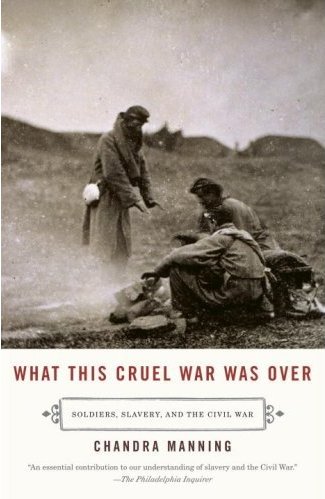In this unprecedented account, Chandra Manning uses letters, diaries, and regimental newspapers to take the reader inside the minds of Civil War soldiers-black and white, Northern and Southern-as they fought and marched across a divided country. With stunning poise and narrative verve, Manning explores how the Union and Confederate soldiers came to identify slavery as the central issue of the war and what that meant for a tumultuous nation. This is a brilliant and eye-opening debut and an invaluable addition to our understanding of the Civil War as it has never been rendered before.
For this impressively researched Civil War social history, Georgetown assistant history professor Manning visited more than two dozen states to comb though archives and libraries for primary source material, mostly diaries and letters of men who fought on both sides in the Civil War, along with more than 100 regimental newspapers. The result is an engagingly written, convincingly argued social history with a point—that those who did the fighting in the Union and Confederate armies "plainly identified slavery as the root of the Civil War." Manning backs up her contention with hundreds of first-person testimonies written at the time, rather than often-unreliable after-the-fact memoirs. While most Civil War narratives lean heavily on officers, Easterners and men who fought in Virginia, Manning casts a much broader net. She includes immigrants, African-Americans and western fighters, in order, she says, "to approximate cross sections of the actual Union and Confederate ranks."
 |
|
|
Dr. Chandra Miller Manning,
graduated summa cum laude from Mount Holyoke College in 1993 and received a M.Phil from the National University of Ireland, Galway, in 1995. She took her Ph.D. at Harvard in 2002. She has lectured in history at Harvard and taught at Pacific Lutheran University in Tacoma, Washington. Currently, she is Assistant Professor of History at Georgetown University and lives in Alexandria, Virginia, with her husband and son. This is her first book. |
In this very important book Chandra Manning examines the ideas of enlisted Civil War soldiers about race, slavery and the Civil War. The result is a revealing picture of what she calls the "road consensus within each army as to why a war needed to be fought" in the 1860s and how that consensus among white Union soldiers evolved as the war went on.
Confederates (even the great majority who did not own slaves) clearly fought to preserve slavery because the institution was the basis of their society, personal and family welfare and status, and a way of life.
Most white Yankees began the war fighting only to preserve the Union. As the conflict went on, however, most of them came to realize that slavery must be destroyed or it would again threaten the character and very existence of the republic.
Many then went on to the next step of favoring full citizenship and equality for black Americans. (The postwar retreat from this last ideal is beyond the scope of Manning's study.)
Black Union soldiers saw the war as the chance to win freedom for their people and to demonstrate that they were worthy of citizenship and equality.
The book is based on extensive research in the letters and diaries of some 1,100 soldiers (477 Confederates; 657 federals). Manning has also made good use of the camp newspapers published from time to time by various military units as well as of several newspapers intended for black readership. These last contain many letters from men serving in units of the United States Colored Troops.
Manning presents the material from all these sources in chronological order, thereby enhancing our understanding of how soldiers' views evolved - or did not evolve - as the war went on.
This is a splendid book that should be read carefully by all who have an interest in the Civil War in general and in the men who fought it in particular.
CWN readers who engage in "living history" will find it especially valuable in getting to know and understand the 19th-century Americans whom they portray. Highly recommended. Five Stars!
Richard M. McMurry's latest book (edited) is An Uncompromising Secessionist: The Civil War of George Knox Miller, 8th (Wade's) Confederate Cavalry.
|

